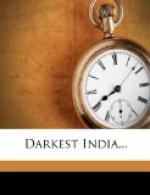In the present case all the above conditions are satisfied. The entire congested labor of the rural districts is thoroughly versed from childhood in the arts of Indian agriculture. They are willing in many parts of the country to emigrate by thousands even across the “kala pani,” to which they have such an intense and religious aversion, or to enlist by thousands in our merchant marine and military forces. Much more then will they be willing to emigrate in far larger numbers to districts close at hand. A leader to inspire, an organisation to enfold, and a plan of campaign to guide, have in the most marvellous manner almost dropped from the skies since the publication of General Booth’s book. The religious and moral restraints and incentives, so important for guarding against the abuses of selfishness and for inspiring with a spirit of cheerful self-sacrifice, are provided, and that in a purely Native garb, and yet with all the advantages of European leadership and enthusiasm. And finally there is land in abundance which Government desires to see colonised, and which is being slowly retailed out bit by bit in a manner altogether unworthy of the urgent necessities of the occasion.
What then is there to hinder a big bold experiment? General Booth will have in England largely to make his agriculturists before he can put them upon the land. Here in India we have millions of skilled destitutes ready to hand, and it will be possible within a very short period with a few bold strokes to relieve the congested labor market from one end of India to the other in a manner that can hardly now be conceived.
Is not this plan infinitely superior to the spasmodic Egyptian expedient of occasional public works, which cost the State enormous sums and only increase the local difficulty as soon as they are completed? Should we not here be erecting a satisfactory and permanent bulwark against the future inroads of famine? Shall we not rather be increasing the public revenue for future years by millions of pounds and that without adding a single new tax, or relying upon sources so uncertain and detrimental to the public welfare as those founded upon the consumption of drugs and liquors that destroy the health of the people? Shall we not again be increasing the stability and glory of the Empire in caring for its destitute masses and in turning what is now a danger to the State into a peaceful, prosperous and contented community? And finally will not our Poor Man’s Paradise be infinitely superior from every point of view to the miserable regulation workhouse, that is in other countries offered by the State, or again to the system of charitable doles and wholesale beggary that at present exists? To me it seems that there is indeed no comparison between the two, and General Booth’s book has opened out a vista of happiness to the poor, such as we should hardly have conceived possible save in connection with a Christian millennium or a Hindoo “Kal Yug.”




